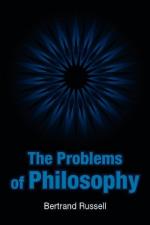|
This section contains 556 words (approx. 2 pages at 400 words per page) |

|
Chapter 1, Appearance and Reality Summary and Analysis
An age-old philosophical problem is whether there is any knowledge in the world so certain that a reasonable man cannot doubt it. Philosophy must proceed critically, not dogmatically, in answering these questions. In daily life, we often assume things to be true that are really full of contradictions. When we look for certainty, therefore, we often think it is appropriate to doubt broadly, particularly our immediate experiences. For instance, considering a table, to the eye it has one appearance but physics describes its reality quite differently.
These differences may seem unimportant but they are not, for instance, they are not unimportant to the painter. The painter finds the table brown but the physicist says that there is no real color in the table, but is rather just the way certain atoms appear to us. Texture...
(read more from the Chapter 1, Appearance and Reality Summary)
|
This section contains 556 words (approx. 2 pages at 400 words per page) |

|




